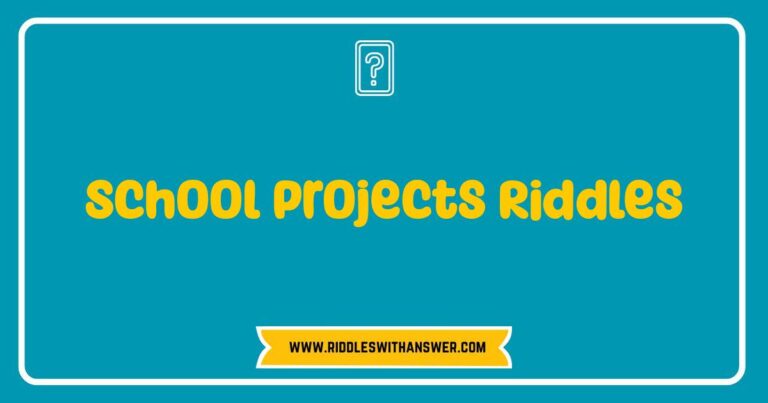150 Best Grammar and Vocabulary Riddles Sharpen Your Mind and Test Your Skills
Think you’re a word wizard? Can you conquer commas and vanquish verbs? Put your linguistic prowess to the ultimate test with our collection of brain-tickling grammar and vocabulary riddles!
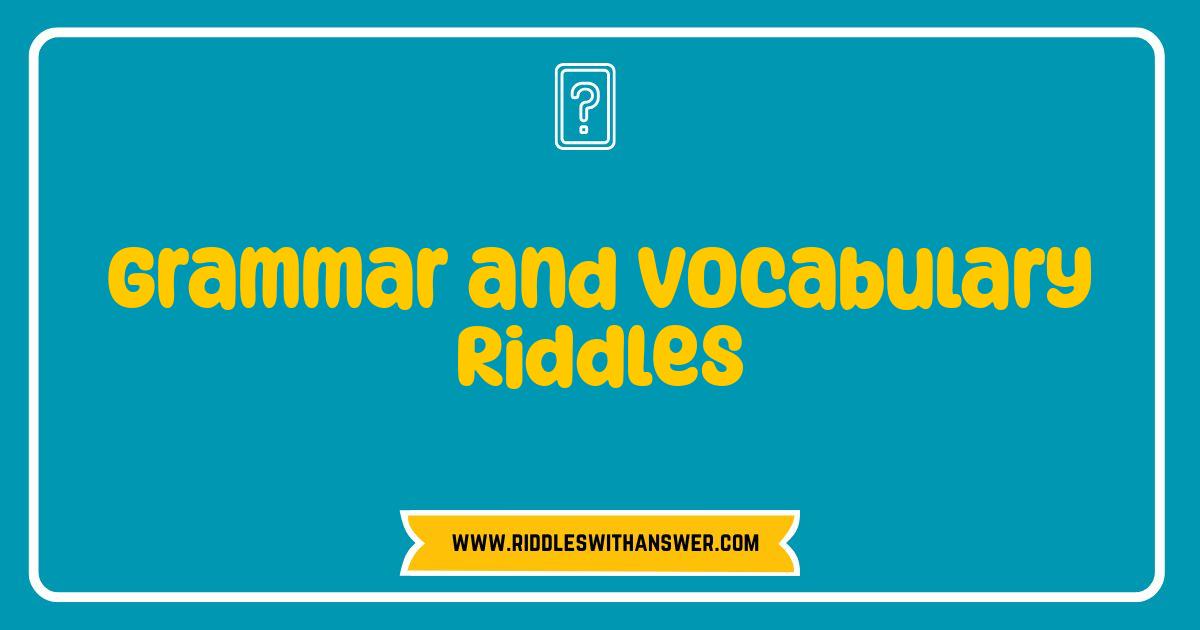
Get ready to sharpen your mind and have some fun. These aren’t your average grammar exercises; we’re talking clever clues and wordplay that will challenge even the most seasoned wordsmith.
Dive in and see if you can solve them all! We bet you’ll learn something new while having a laugh.
Best Grammar and Vocabulary Riddles Sharpen Your Mind and Test Your Skills
Riddle: I can be broken without being held. I can be answered without being asked. What am I?
Answer: A question
Riddle: I have a body, but no legs. I have a tail, but no wag. I can tell a story, but have no voice. What am I?
Answer: A comma
Riddle: I am a word that describes myself. What am I?
Answer: Autological
Riddle: I change everything, yet I remain the same. What am I?
Answer: A tense
Riddle: I exist when you need more than one, but vanish when you have only one. What am I?
Answer: The letter ‘S’
Riddle: I am a point of view, always subjective. What am I?
Answer: First person
Riddle: I can be a fruit or an error. What am I?
Answer: A typo (pear/pair)
Riddle: I am a word that looks the same backward and forward. What am I?
Answer: Palindrome
Riddle: I always follow and never lead, mimicking sounds of what’s been said. What am I?
Answer: An echo
Riddle: I am long when you’re happy, and short when you’re mad. What am I?
Answer: A sentence
Riddle: I have no voice, but I can tell you stories. I have no body, but I can take you places. What am I?
Answer: A book
Riddle: I am a question mark’s curvy cousin, often used to list a dozen. What am I?
Answer: A semicolon
Riddle: I’m a sound-alike, yet distinctly different. What am I?
Answer: Homophone
Riddle: I am a group of words, but not a sentence. What am I?
Answer: A phrase
Riddle: I am a word that means the opposite of itself. What am I?
Answer: A contronym (or auto-antonym)
Unlocking Linguistic Fun: Grammar Riddles for Word Nerds
Dive into “Unlocking Linguistic Fun,” a collection of grammar riddles perfect for word nerds! Test your knowledge of parts of speech, punctuation, and syntax with these brain-teasing puzzles. Sharpen your linguistic skills while enjoying a playful challenge that proves grammar can be surprisingly entertaining. Get ready for a delightful wordplay…
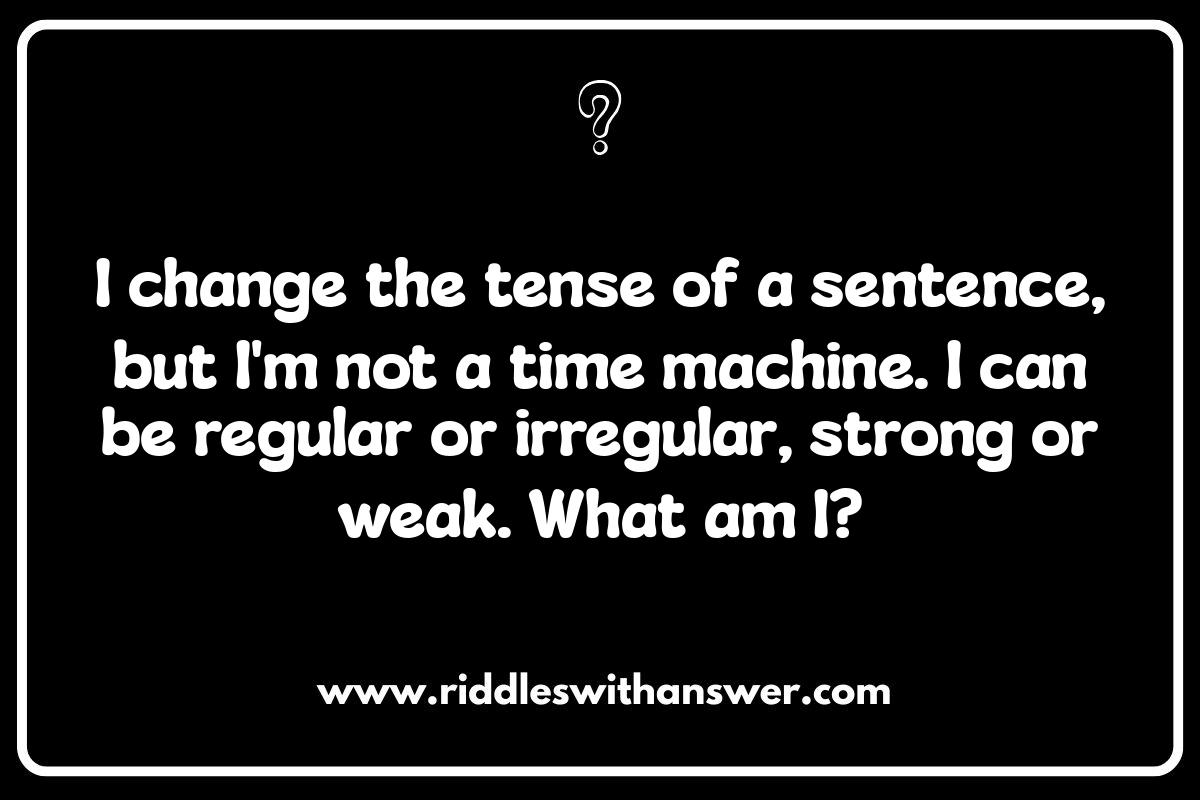
Riddle: I change the tense of a sentence, but I’m not a time machine. I can be regular or irregular, strong or weak. What am I?
Answer: A verb
Riddle: I am a word that connects words, phrases, or clauses, but I’m not a bridge. What am I?
Answer: A conjunction
Riddle: I describe a noun, adding color and flair, but I’m not a painter. What am I?
Answer: An adjective
Riddle: I modify a verb, adjective, or another adverb, telling you how, when, where, or to what extent, but I’m not a GPS. What am I?
Answer: An adverb
Riddle: I point out a noun, but I’m not a finger. I can be definite or indefinite. What am I?
Answer: An article
Riddle: I show the relationship between a noun or pronoun and other words in the sentence, but I’m not a family tree. What am I?
Answer: A preposition
Riddle: I am a punctuation mark used to separate items in a list, but I’m not a fence. What am I?
Answer: A comma
Riddle: I show possession, but I don’t own anything. I am a punctuation mark. What am I?
Answer: An apostrophe
Riddle: I end a sentence with authority, but I’m not a judge. What am I?
Answer: A period
Riddle: I am a word that sounds the same as another word, but I’m spelled differently and have a different meaning. What am I?
Answer: A homophone
Riddle: I’m a word that looks and is spelled the same but has different meanings. What am I?
Answer: A homonym
Riddle: I express sudden emotion, but I’m not a therapist. What am I?
Answer: An interjection
Riddle: I am a phrase that is often repeated, but is not original to you. What am I?
Answer: A cliche
Riddle: I am a word or phrase used to stand in for something, or someone, else. What am I?
Answer: A pronoun
Riddle: I am a group of words that contains a subject and a verb and expresses a complete thought, but I am not always a sentence. What am I?
Answer: A clause
Vocabulary Riddles: Expanding Your Lexical Horizons
Unlock the power of language with vocabulary riddles! “Grammar and Vocabulary Riddles” offers a playful way to expand your lexical horizons. Deciphering wordplay not only sharpens your mind but also makes learning fun. Discover new words, explore nuances, and boost your communication skills through engaging challenges.
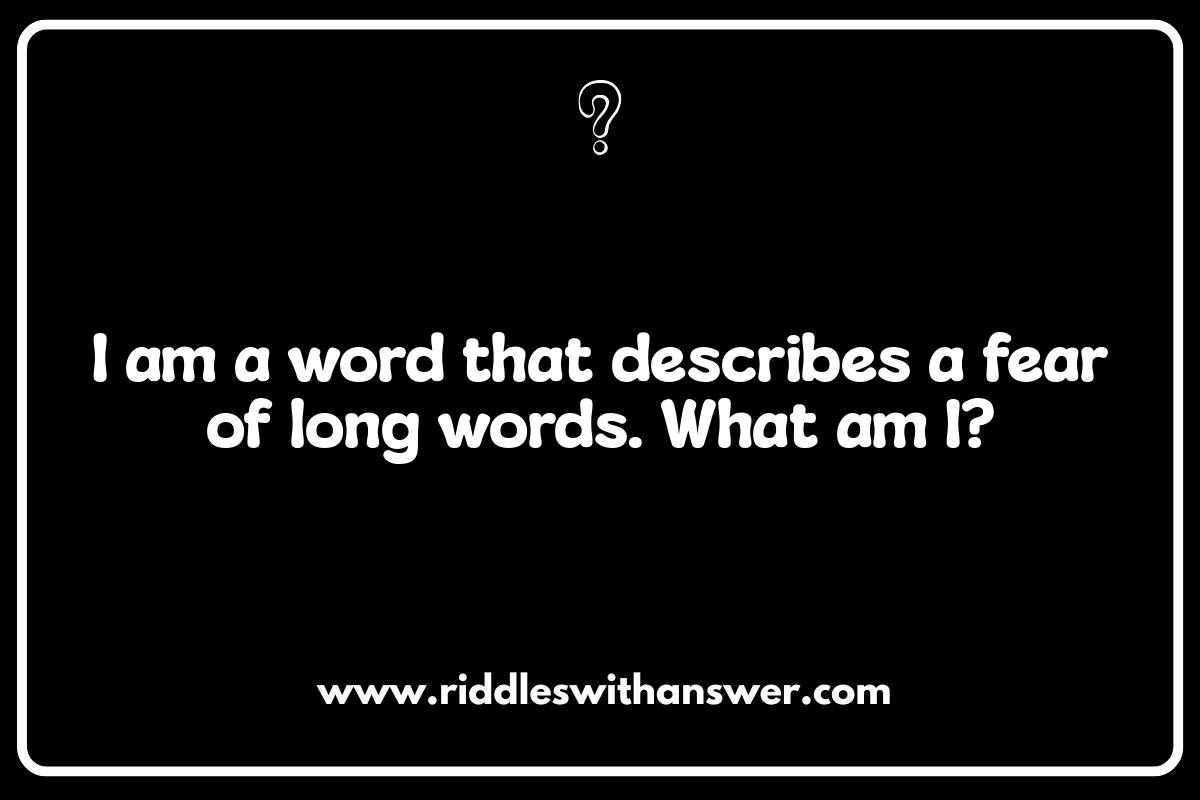
Riddle: I am a word that describes a fear of long words. What am I?
Answer: Hippopotomonstrosesquippedaliophobia
Riddle: I am a word that means “something that is out of place.” What am I?
Answer: Anachronism
Riddle: I am a noun that describes a temporary state of inactivity, like a bear in winter. What am I?
Answer: Hibernation
Riddle: I am a verb meaning to prove wrong by argument or evidence. What am I?
Answer: Refute
Riddle: I am an adjective describing something that is impossible to avoid or prevent. What am I?
Answer: Inevitable
Riddle: I am a word for a short, witty statement expressing a general truth or observation. What am I?
Answer: Aphorism
Riddle: I mean excessively talkative, especially on trivial matters. What am I?
Answer: Garrulous
Riddle: I am a noun that refers to a person who loves books. What am I?
Answer: Bibliophile
Riddle: I am an adjective describing something extremely unpleasant or repulsive. What am I?
Answer: Repugnant
Riddle: I am a verb that means to praise enthusiastically. What am I?
Answer: Extol
Riddle: I am a noun that describes a state of perfect happiness and peace. What am I?
Answer: Bliss
Riddle: I am an adjective describing something that is easily damaged or broken. What am I?
Answer: Fragile
Riddle: I am a noun that means a false or mistaken idea. What am I?
Answer: Fallacy
Riddle: I am a word that describes a state of being unknown or unrecognized. What am I?
Answer: Obscurity
Riddle: I am an adjective that describes something that is brief and to the point. What am I?
Answer: Succinct
Grammar and Vocabulary Riddles: A Brain-Boosting Challenge
Unleash your inner word wizard! “Grammar and Vocabulary Riddles” sharpens your language skills with playful puzzles. Decode tricky definitions, unravel grammatical knots, and expand your lexicon. This brain-boosting challenge transforms learning into an engaging game, perfect for word nerds and anyone seeking a fun mental workout.
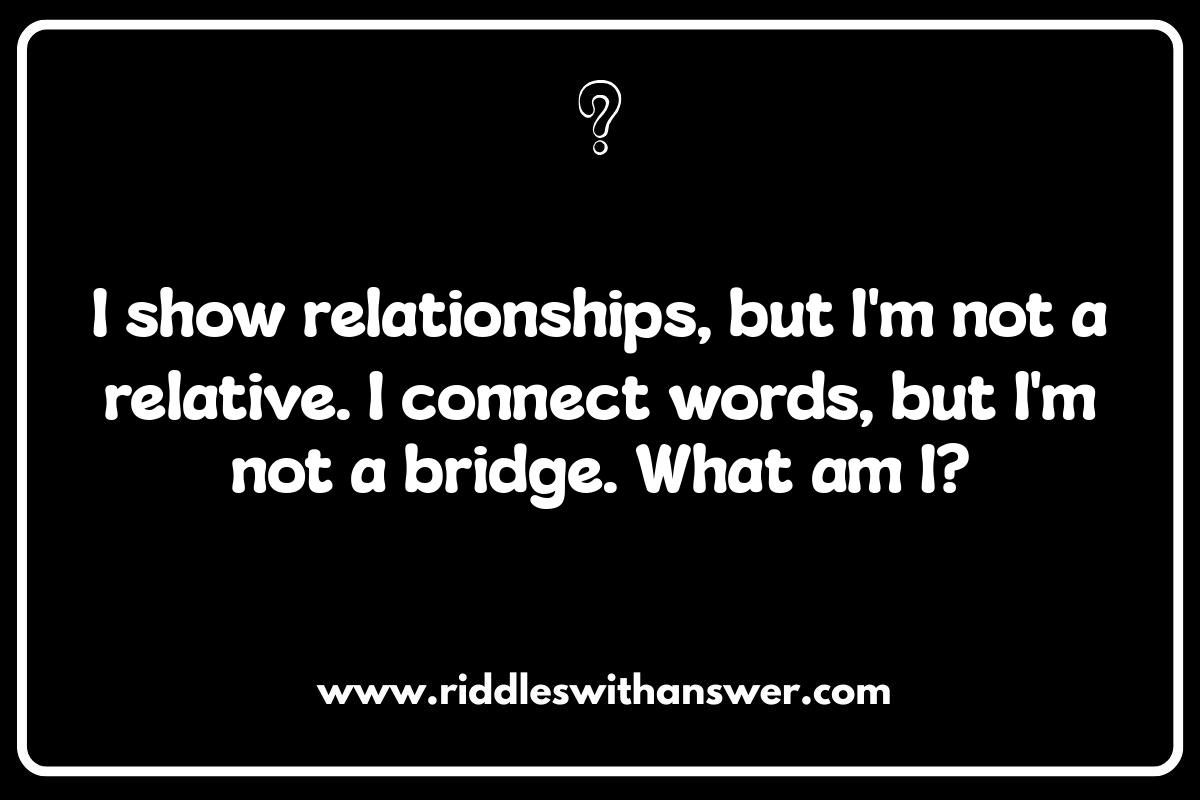
Riddle: I show relationships, but I’m not a relative. I connect words, but I’m not a bridge. What am I?
Answer: Preposition
Riddle: I can be regular or irregular, active or passive. I express an action or a state of being. What am I?
Answer: Verb
Riddle: I modify nouns and pronouns, adding detail and description, but I’m not a painter with a brush. What am I?
Answer: Adjective
Riddle: I’m a string of words, grammatically sound, expressing a complete thought, profound. What am I?
Answer: Sentence
Riddle: I can be proper or common, countable or uncountable. I name a person, place, thing, or idea. What am I?
Answer: Noun
Riddle: I stand in for a noun, taking its place, avoiding repetition with grace. What am I?
Answer: Pronoun
Riddle: I have a root, prefixes, and suffixes, changing my meaning with additions. What am I?
Answer: Word
Riddle: I end a sentence with excitement or surprise! What am I?
Answer: Exclamation point
Riddle: I create comparisons, but I’m not a sibling. I use “like” or “as” to show how things relate. What am I?
Answer: Simile
Riddle: I’m a group of words lacking a subject or verb, but I still add flavor to what you’ve observed. What am I?
Answer: Phrase
Riddle: I can be used to join two independent clauses, but I am not glue. What am I?
Answer: Conjunction
Riddle: I am the study of the arrangement of words and phrases to create well-formed sentences in a language. What am I?
Answer: Syntax
Riddle: I express a strong feeling, but I’m not a hug. I’m a word or sound, often short and sweet. What am I?
Answer: Interjection
Riddle: I’m a mistaken use of a word in place of a similar-sounding one, often leading to humorous results. What am I?
Answer: Malapropism
Riddle: I’m a word that describes an action, event, or state that is actually the opposite of what is expressed. What am I?
Answer: Irony
Deciphering the Code: How to Solve Grammar Riddles
Unraveling grammar riddles can feel like cracking a secret code! “Deciphering the Code” equips you with the tools to do just that. By understanding grammatical structures and vocabulary nuances, you’ll transform puzzling sentences into clear, concise solutions. Sharpen your linguistic skills and unlock the fun hidden within these brain-teasing challenges.
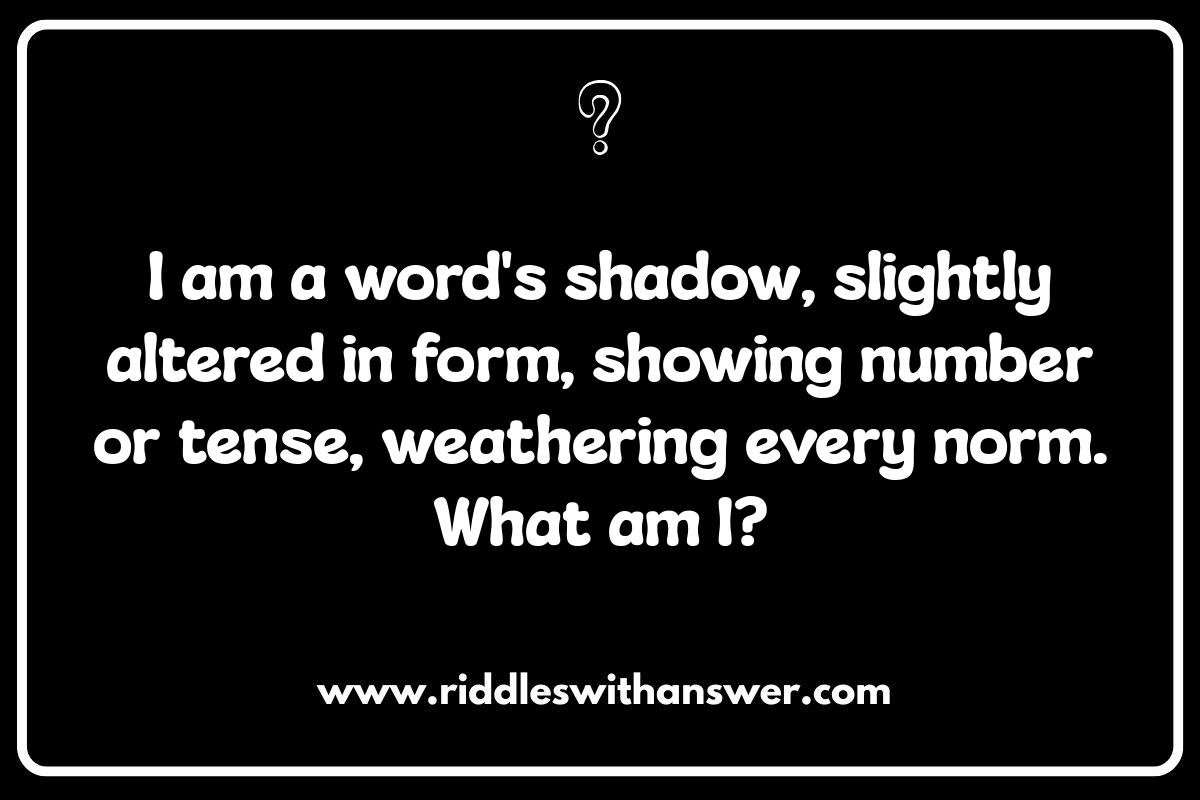
Riddle: I am a word’s shadow, slightly altered in form, showing number or tense, weathering every norm. What am I?
Answer: Inflection
Riddle: I’m a mark that signals a pause, but I’m not a full stop. I can separate clauses, or set off a shop. What am I?
Answer: Comma
Riddle: I link words and phrases, showing how they relate, but I am not glue. What am I, sealing their fate?
Answer: Conjunction
Riddle: I describe a noun, painting a picture so clear, adding detail and flair, making its presence held near. What am I?
Answer: Adjective
Riddle: I show possession, but own nothing at all. What am I, answering grammar’s call?
Answer: Apostrophe
Riddle: I’m a word that replaces a noun to avoid repetition, what am I?
Answer: Pronoun
Riddle: I am a word that connects to a verb, an adjective, or adverb, to give more context. What am I?
Answer: Adverb
Riddle: I am a group of words, with a subject and predicate, expressing a complete thought. What am I?
Answer: Clause
Riddle: I’m a figure of speech where opposites combine, creating a concept both strange and divine. “Bittersweet” is an example you see. What am I?
Answer: Oxymoron
Riddle: I stand alone, yet bring others together; I modify nouns, in all kinds of weather. What am I?
Answer: Article
Riddle: I am added to the end of a word, changing its meaning, what am I?
Answer: Suffix
Riddle: I am a word that names a person, place, thing, or idea. What am I?
Answer: Noun
Riddle: I am added to the beginning of a word, changing its meaning, what am I?
Answer: Prefix
Riddle: I express an action, occurrence, or state of being. What am I?
Answer: Verb
Riddle: I am a word that is similar in meaning to another word. What am I?
Answer: Synonym
From Homophones to Syntax: Exploring Diverse Vocabulary Riddles
“Grammar and Vocabulary Riddles” dives into the fascinating world of words! “From Homophones to Syntax” specifically challenges your linguistic wit. Can you untangle tricky homophones, decode grammatical structures, and solve puzzles based on varied vocabulary? Get ready for brain-teasing fun that’ll sharpen your word skills.
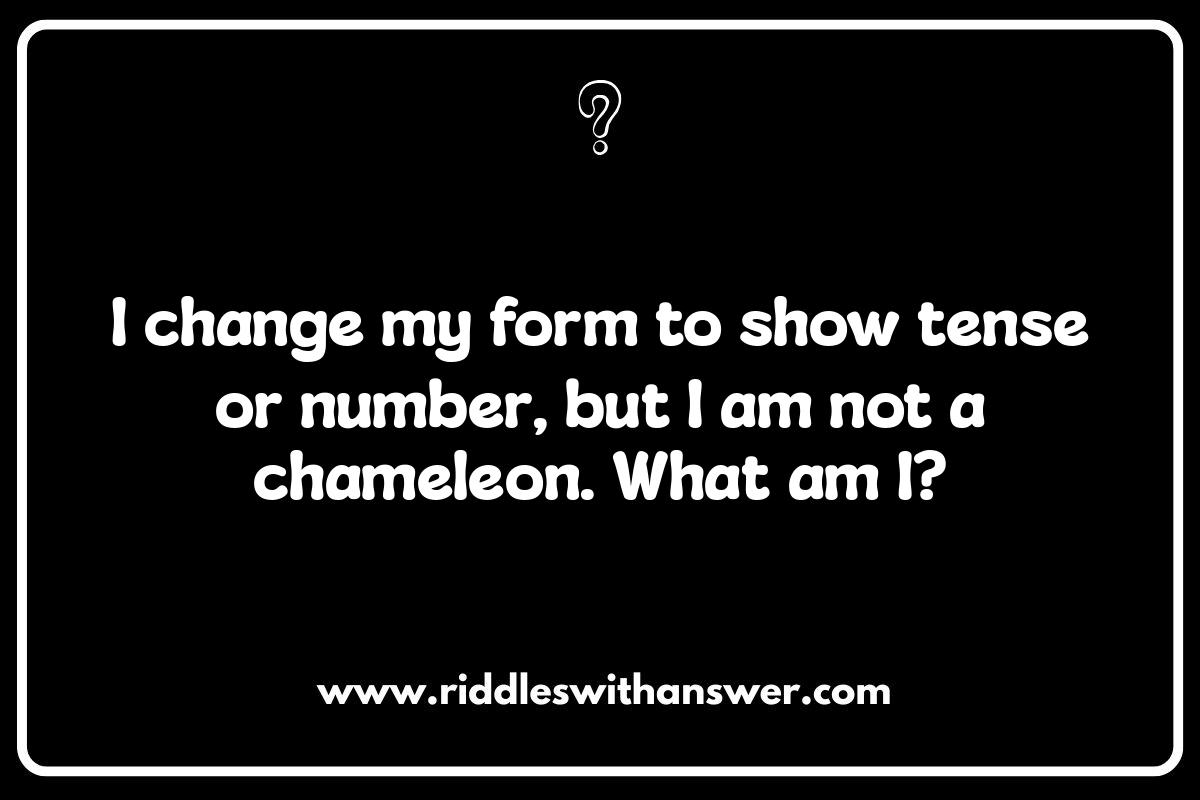
Riddle: I change my form to show tense or number, but I am not a chameleon. What am I?
Answer: A verb
Riddle: I can be split, compound, or complex, but I’m not a building. What am I?
Answer: A sentence
Riddle: I show relationships between words, but I’m not a family tree. I indicate location, direction, or time. What am I?
Answer: A preposition
Riddle: I modify nouns and pronouns, adding detail and flair, but I’m not a painter. What am I?
Answer: An adjective
Riddle: I connect words and phrases, showing how they relate, but I am not glue. What am I?
Answer: A conjunction
Riddle: I’m a word that sounds the same, but has a different meaning and spelling. What am I?
Answer: A homophone
Riddle: I show strong emotion, but I’m not a therapist. What am I?
Answer: An interjection
Riddle: I take the place of a noun, but I am not a substitute teacher. What am I?
Answer: A pronoun
Riddle: I can be past, present, or future. I show when an action takes place. What am I?
Answer: Tense
Riddle: I describe how something is done, often ending in “-ly”. What am I?
Answer: An adverb
Riddle: I am the arrangement of words in a sentence, but I am not an orchestra conductor. What am I?
Answer: Syntax
Riddle: I point out a noun, but I’m not a finger. I can be definite or indefinite. What am I?
Answer: An article
Riddle: I’m a word or phrase that’s overused and lacks impact. What am I?
Answer: A cliché
Riddle: I’m a word or phrase used to stand in for something, or someone, else. What am I?
Answer: A metaphor
Riddle: I’m a group of words that adds extra information to a sentence, but I don’t have a subject or verb. What am I?
Answer: A phrase
Grammar Riddles in Education: Making Learning Engaging
Grammar and vocabulary riddles transform language learning into an exciting game! These brain-teasers encourage students to think critically about word meanings and sentence structure. By solving these riddles, students actively engage with grammar rules and expand their vocabulary in a fun, memorable way, making learning far more effective and enjoyable.
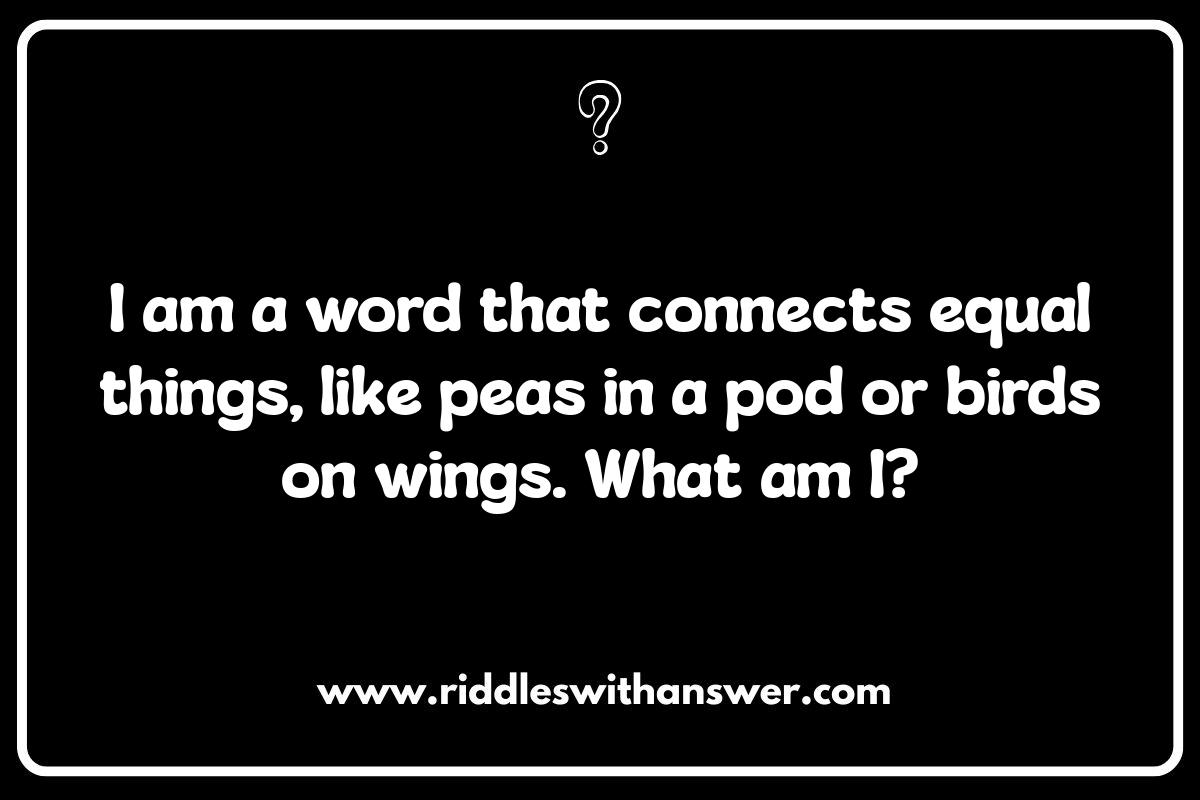
Riddle: I am a word that connects equal things, like peas in a pod or birds on wings. What am I?
Answer: Coordinating conjunction
Riddle: I change my spelling to show I own something, adding a mark before the ‘s’ or just after if there’s a throng. What am I?
Answer: Possessive apostrophe
Riddle: I can be simple, compound, complex, or compound-complex, but I never live in a building. What am I?
Answer: Sentence structure
Riddle: I describe a noun, but I’m not an adjective. I can be restrictive or nonrestrictive, adding extra information. What am I?
Answer: Appositive
Riddle: I show a relationship of space or time, connecting nouns to other parts of the rhyme. What am I?
Answer: Preposition
Riddle: I am a word that’s the same forwards and backward, a linguistic palindrome, easily tracked. What am I?
Answer: Palindrome
Riddle: I am a group of words missing a subject or verb, but I add detail to what you’ve observed. What am I?
Answer: Phrase
Riddle: I can be proper, common, or abstract, countable or uncountable, and I name everything you see. What am I?
Answer: Noun
Riddle: I take the place of a noun, saving you the repetition, but I am not a substitute teacher. What am I?
Answer: Pronoun
Riddle: I am a word that expresses an action, occurrence, or state of being, keeping sentences moving and things agreeing. What am I?
Answer: Verb
Riddle: I am a word that modifies verbs, adjectives, or other adverbs, telling you how, when, where, or to what extent. What am I?
Answer: Adverb
Riddle: I describe a noun, adding detail and flair, making your writing more vivid, beyond compare. What am I?
Answer: Adjective
Riddle: I am a word that sounds like another, but my spelling and meaning are quite another. What am I?
Answer: Homophone
Riddle: I am a group of words with a subject and a verb, expressing a complete thought. What am I?
Answer: Clause
Riddle: I create vivid pictures with words, helping you see things that are absurd. I’m not literally true, but add to the art. What am I?
Answer: Figure of speech
Beyond Definitions: Mastering Vocabulary Riddles for Comprehension
Unlock language’s playful side! “Beyond Definitions” dives into vocabulary riddles, boosting your comprehension. It’s more than memorizing words; it’s about understanding their nuances and clever applications within grammar puzzles. Sharpen your wit and word skills – decode the riddles and become a true language master!
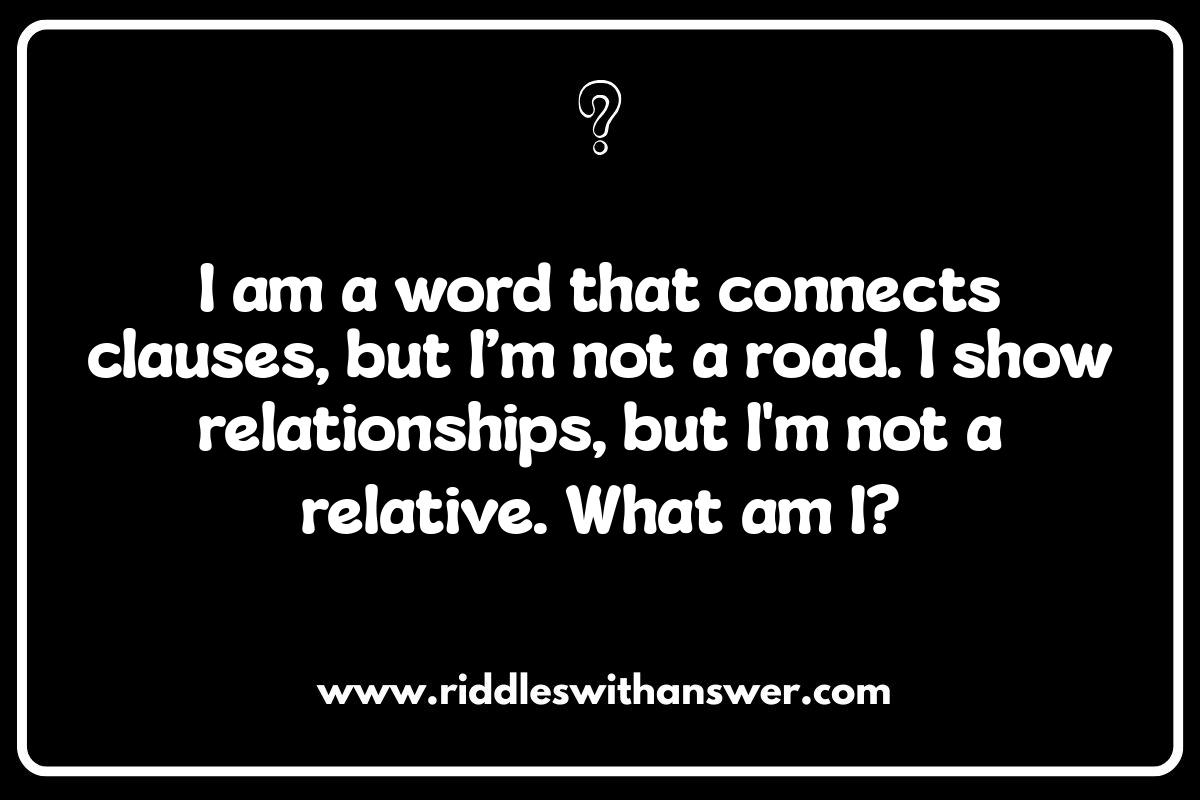
Riddle: I am a word that connects clauses, but I’m not a road. I show relationships, but I’m not a relative. What am I?
Answer: Conjunction
Riddle: I change my form to show tense, but I’m not a shapeshifter. I express action, but I’m not a movie star. What am I?
Answer: Verb
Riddle: I describe a noun, but I’m not an artist. I add detail, but I’m not a decorator. What am I?
Answer: Adjective
Riddle: I modify verbs and adjectives, but I’m not a fashion designer. I tell you how, when, where, or to what extent. What am I?
Answer: Adverb
Riddle: I stand in for a noun, but I’m not a substitute teacher. I prevent repetition, but I’m not a broken record. What am I?
Answer: Pronoun
Riddle: I am a group of words that lacks a subject or a verb, yet I add flavor to what you’ve observed. What am I?
Answer: Phrase
Riddle: I contain both a subject and a verb, expressing a complete thought, but I’m not always a full stop. What am I?
Answer: Clause
Riddle: I show the relationship between a noun and other words, but I’m not a family tree. I indicate location or time. What am I?
Answer: Preposition
Riddle: I am a word that sounds like another, but my spelling and meaning are quite another. What am I?
Answer: Homophone
Riddle: I am a group of words expressing a complete thought. I start with a capital letter and end with a period, question mark, or exclamation point. What am I?
Answer: Sentence
Riddle: I am a mistaken use of a word in place of a similar-sounding one, often leading to humorous results. What am I?
Answer: Malapropism
Riddle: I am a clever turn of phrase, using words in a playful maze. What am I?
Answer: Pun
Riddle: I am a word that is similar in meaning to another word. What am I?
Answer: Synonym
Riddle: I am a word that is opposite in meaning to another word. What am I?
Answer: Antonym
Riddle: I am added to the end of a word, changing its meaning but not its essence. What am I?
Answer: Suffix





